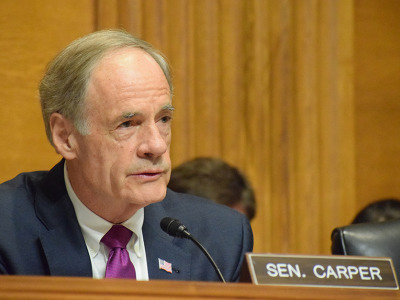President Joe Biden’s ambitious climate change goals, including a cut in 2005 greenhouse gas emission levels by 50% within seven years, will require massive investments in renewable energy and the nation’s transmission system as well.
But without a speedier way of obtaining federal permits, efforts to spur the production of renewable energy will languish, the administration, lawmakers and analysts say. This is despite $379 billion in tax breaks and direct investments in clean energy in the Inflation Reduction Act.
Carbon sequestration projects that inject carbon dioxide underground also could run into permitting issues.
That has led to an upsurge in planned investment into clean energy projects and a slew of permitting reform proposals in Congress, all aiming to streamline what most call a cumbersome, expensive and time-consuming process. House Republicans have included permitting language in their Limit, Save, Grow Act legislation to raise the nation's borrowing authority, and senators have introduced their own legislative proposals.
In addition to draft language from Sen. Joe Manchin, D-W.V., there is a bill from his Republican colleagues, Sen. Shelley Moore Capito of West Virginia and John Barrasso of Wyoming, and a discussion draft released last week by Environment and Public Works Committee Chairman Tom Carper, D-Del.
 Sen. Joe Manchin, D-W.Va. (AP Photo/Mariam Zuhaib)
Sen. Joe Manchin, D-W.Va. (AP Photo/Mariam Zuhaib)The White House also has released its priorities, saying that “to build infrastructure expediently and responsibly, the necessary reviews, permits and approvals need to be robust, be completed within a predictable timeframe, and result in prompt and legally defensible decisions.”
The White House urged Congress to take action “to further improve coordination of federal data sharing and reviews, expand the use of programmatic and tiered reviews, reduce the length of federal decision documents, and set reasonable decision time frames for projects.”
Despite a bipartisan desire for reform, a bipartisan solution may be difficult to come by due to the divided nature of Congress and the differing priorities of industry and environmental groups.
The issue is being discussed in talks on the debt ceiling, but the early-June deadline for resolving that issue could make it difficult to reach a deal on legislative language.
“Even though permitting reform is — as Rodgers and Hammerstein might say — ‘busting out all over’ with a legislative momentum that suggests positive odds of passage, we would add two cautionary notes,” ClearView Energy Partners said in an analysis, pointing to a longtime partisan divide exacerbated by Democrats’ use of “parliamentary procedures” to pass the IRA along party lines.
“Second, time does not always improve things,” the analysis said. “If permitting reform were inevitable, its proponents would not be looking to a ‘must-pass’ bill like the debt ceiling, and if its momentum were insurmountable, it would not require a forcing event like imminent default to propel it.”
Democrats themselves are divided. Carper’s far-reaching proposal includes language previously offered by Sens. Sheldon Whitehouse, D-R.I., on interstate transmission and Ed Markey, D-Mass., on environmental justice.
ClearView characterized Carper’s proposal as “well to the left of (Manchin’s). As such, the key Democrats in the Senate haven’t come closer to each other, let alone to the proposals made by their GOP counterparts.”
Their conclusion? “Hammering out a substantive permitting reform deal looks likely to require hard compromises and language that differs from that outlined by the respective sides to date. For this reason, we think additional negotiation time could facilitate this, but would not guarantee it comes together.”
Business interests are pushing hard for the debt ceiling deal to include permitting reform, but environmental groups and their allies in Congress are strongly opposed.
In a letter to Democratic leaders and the White House, 78 House Democrats said the House-passed Limit, Save, Grow Act includes “ideological attacks" on the National Environmental Policy Act that would "eliminate requirements to consider climate change and pollution impacts, cut public input opportunities, and limit judicial review.”
Another letter from Sen. Bernie Sanders, I-Vt., and 10 Senate Democrats on May 18 urged Biden to use the 14th Amendment to the Constitution to raise the debt ceiling, arguing against many of the priorities Republicans have espoused throughout the talks.
“We … cannot allow these budget negotiations to undermine the historic clean energy and environmental justice investments made by Congress and your administration by allowing fossil fuel companies to unleash a flood of dirty energy projects that will worsen the climate crisis and disproportionately impact frontline communities,” the senators said. “We must continue the transition from fossil fuels to clean and renewable energy.”
Don’t miss a beat! It’s easy to sign up for a FREE month of Agri-Pulse news! For the latest on what’s happening in Washington, D.C. and around the country in agriculture, just click here.
Ed Thomas, vice president of government affairs at The Fertilizer Institute, said he’s not sure how much willingness there is to compromise. “Maybe if everybody wants to get their little piece of the pie, and everybody really wants to talk, we'll really make some difference,” he said.
“But I don't think it's going to be at the level of making a drastic change,” he added.
The centerpiece of any legislative changes is likely to be NEPA, the bedrock environmental law that requires federal agencies to examine the environmental impacts of projects before they can be approved.
 Sen. Tom Carper, D-Del.
Sen. Tom Carper, D-Del.“We certainly would like to see real wholesale changes to NEPA,” Thomas said. “That's really the regulation that causes a lot of permitting consternation. For example, we have a phosphate mine out in Idaho that has been in the permitting process for 12 years” at a cost of $25 million. “They're still not through the process.”
Most of the proposals would set deadlines for completion of NEPA reviews, though Carper's proposal would prioritize projects that mitigate environmental harm or address "climate mitigation" or "resilience projects."
But Thomas says besides NEPA, the government needs to look at permitting requirements for Class VI wells, which can be used to store carbon dioxide in connection with low-carbon ammonia projects.
“It can take decades to get those Class VI permits, and if they don't do something to streamline that process, that timeline in the IRA is going to run out, and it's not going to be any good.”
The House bill and the Barrasso bill both address Class Vi issues, the Manchin and Carper bills don't address those issues.
The IRA includes a tax break of up to $85 per ton of CO2, starting in 2026. But the bill also has a seven-year extension to qualify for the tax credit, meaning that projects have until January 2033 to begin construction.
For more news, go to www.Agri-Pulse.com.


